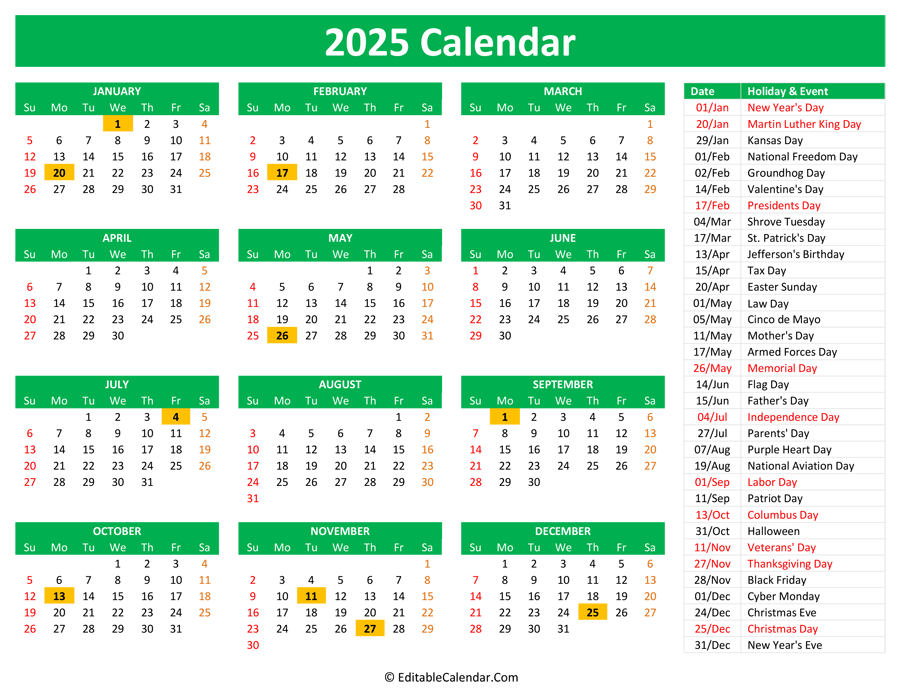Navigating The Holidays: A Comprehensive Guide To Week-Long Celebrations In 2025
Navigating the Holidays: A Comprehensive Guide to Week-Long Celebrations in 2025
Related Articles: Navigating the Holidays: A Comprehensive Guide to Week-Long Celebrations in 2025
Introduction
With enthusiasm, let’s navigate through the intriguing topic related to Navigating the Holidays: A Comprehensive Guide to Week-Long Celebrations in 2025. Let’s weave interesting information and offer fresh perspectives to the readers.
Table of Content
Navigating the Holidays: A Comprehensive Guide to Week-Long Celebrations in 2025

As the year 2025 unfolds, we find ourselves amidst a tapestry of cultural traditions and celebrations. This guide aims to provide a comprehensive overview of significant holidays observed throughout the week, offering insights into their historical significance, cultural practices, and contemporary relevance.
A Glimpse into the Week’s Observances
The week in question is likely to be brimming with diverse holidays, each representing a unique facet of global culture. While specific dates may vary depending on the year and region, a typical week could feature:
-
Religious Holidays: The week might encompass religious celebrations like Eid al-Adha, a major Islamic festival commemorating the willingness of Prophet Ibrahim to sacrifice his son, Ismail. This festival is marked by communal prayers, animal sacrifices, and the sharing of meals. Similarly, Hanukkah, the Jewish Festival of Lights, could fall within this week, symbolizing the miracle of the oil lasting for eight days during the Maccabean Revolt.
-
National Holidays: The week might also include national celebrations like Independence Day in various countries, commemorating the attainment of independence from colonial rule. These days often involve parades, patriotic displays, and celebrations of national identity.
-
Cultural Festivals: The week could feature cultural festivals like Diwali, the Hindu Festival of Lights, celebrated with vibrant decorations, fireworks, and the sharing of sweets. This festival symbolizes the victory of good over evil and the triumph of light over darkness.
Delving Deeper: Understanding the Importance of These Observances
These holidays serve as more than just days off from work or school. They represent a rich tapestry of cultural heritage, offering opportunities for:
-
Preservation of Traditions: Holidays provide a platform for preserving and transmitting cultural heritage across generations. Through rituals, stories, and shared experiences, these celebrations keep traditions alive and ensure their continued relevance.
-
Strengthening Community Bonds: Holidays offer a chance for communities to come together, fostering a sense of belonging and shared identity. The collective celebration of traditions and values reinforces social connections and strengthens community ties.
-
Promoting Understanding and Tolerance: By observing and celebrating diverse holidays, individuals gain a deeper understanding and appreciation for different cultures. This fosters tolerance and respect for diverse perspectives, promoting a more inclusive and harmonious society.
-
Reflecting on Personal Values: Many holidays provide opportunities for personal reflection and introspection. Whether it’s contemplating the meaning of sacrifice during Eid al-Adha or reflecting on the importance of light during Hanukkah, these celebrations encourage individuals to examine their own values and beliefs.
Frequently Asked Questions (FAQs): Addressing Common Queries
Q1: What are the key differences between Eid al-Adha and Eid al-Fitr?
A1: While both are Islamic festivals, Eid al-Adha marks the end of the Hajj pilgrimage and commemorates Prophet Ibrahim’s willingness to sacrifice his son, while Eid al-Fitr marks the end of Ramadan, the month of fasting.
Q2: How is Hanukkah celebrated in modern times?
A2: Modern Hanukkah celebrations involve lighting the menorah, enjoying traditional foods like latkes and sufganiyot, playing dreidel, and exchanging gifts.
Q3: What are the common practices during Diwali?
A3: Diwali is celebrated with the lighting of diyas (oil lamps), decorating homes with rangoli (colorful patterns), bursting firecrackers, and sharing sweets and gifts.
Q4: What are some tips for observing holidays respectfully?
A4: Respectful observation of holidays involves being mindful of cultural sensitivities, learning about the traditions and significance of the holiday, and avoiding any actions that might be considered disrespectful or offensive.
Tips for Engaging with Holiday Celebrations
-
Learn about the traditions: Take the time to understand the historical and cultural significance of each holiday you encounter. This will allow you to appreciate the depth and meaning behind the celebrations.
-
Participate in local events: Many communities organize events and activities related to various holidays. Attending these events can provide a firsthand experience of cultural traditions and create meaningful connections.
-
Engage in respectful dialogue: If you encounter someone celebrating a holiday different from your own, approach the conversation with curiosity and respect. Ask questions, learn about their traditions, and share your own experiences.
Conclusion: Embracing the Diversity of Celebrations
The week in question presents a unique opportunity to engage with the rich tapestry of global holidays. By understanding the significance of these celebrations, participating in local events, and engaging in respectful dialogue, we can foster a deeper appreciation for cultural diversity and build stronger communities. These holidays serve as powerful reminders of our shared humanity and the importance of celebrating the unique traditions that make us who we are.








Closure
Thus, we hope this article has provided valuable insights into Navigating the Holidays: A Comprehensive Guide to Week-Long Celebrations in 2025. We thank you for taking the time to read this article. See you in our next article!